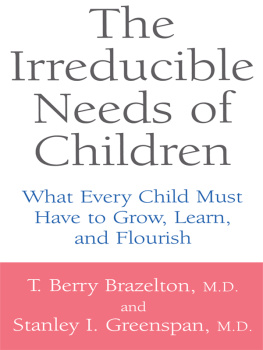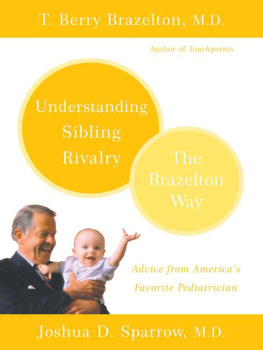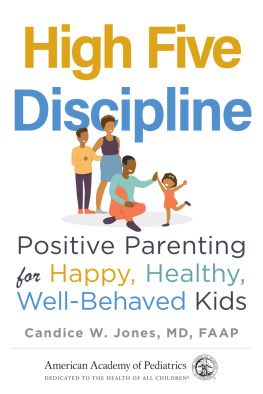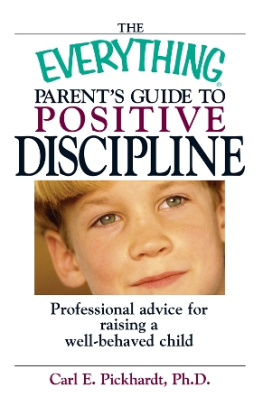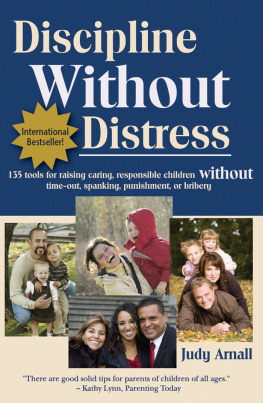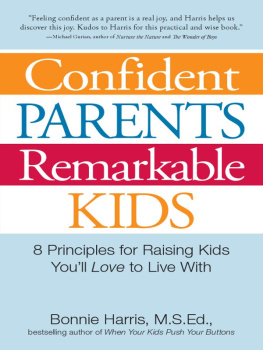
ALSO BY T. Berry Brazelton, MD

On Becoming a Family
The Growth of Attachment Before and After Birth
Infants and Mothers
Differences in Development
Toddlers and Parents
Declaration of Independence
Doctor and Child
To Listen to a Child
Understanding the Normal Problems of Growing Up
Working and Caring
What Every Baby Knows
Families, Crisis, and Caring
Touchpoints
Your Childs Emotional and Behavioral Development revised with Joshua D. Sparrow, MD
Going to the Doctor
The Earliest Relationship
Parents, Infants, and the Drama of Early Attachment with Bertrand G. Cramer, MD
The Irreducible Needs of Children
with Stanley I. Greenspan
ALSO BY T. BERRY BRAZELTON, MD, and JOSHUA D. SPARROW, MD

Touchpoints Three to Six
Your Childs Emotional and Behavioral Development
Calming Your Fussy Baby
The Brazelton Way
Sleep
The Brazelton Way
Feeding Your Child
The Brazelton Way
Toilet Training Your Child
The Brazelton Way
Understanding Sibling Rivalry
The Brazelton Way
Mastering Anger and Aggression
The Brazelton Way


PHOTO CREDITS
Photographs on pages xxiv, 32, 104, and title page [upper and lower left] by Janice Fullman
Photographs on pages 56, 142, and title page [upper and lower right] by Dorothy Littell Greco
Photograph on page 78 by Isabelle Bleecker
Photograph on page xx by Marilyn Nolt
Copyright 2003, 2015 by T. Berry Brazelton, MD, and Joshua D. Sparrow, MD
Many of the designations used by manufacturers and sellers to distinguish their products are claimed as trademarks. Where those designations appear in this book, and where Da Capo was aware of a trademark claim, the designations have been printed in initial capital letters.
All rights reserved. No part of this publication may be reproduced, stored in a retrieval system, or transmitted, in any form or by any means, electronic, mechanical, photocopying, recording, or otherwise, without the prior written permission of the publisher. Printed in the United States of America. For information, address Da Capo Press, 44 Farnsworth Street, 3rd Floor, Boston, MA 02210.
Text design by Pauline Brown
Set in 11.5 point Adobe Garamond Pro by the Perseus Books Group
Library of Congress Cataloging-in-Publication Data
Brazelton, T. Berry, 1918-
Discipline: the Brazelton way / T. Berry Brazelton, MD, Joshua D. Sparrow, MD. Second edition.
pages cm
Includes bibliographical references and index.
ISBN 978-0-7382-1838-0 (e-book) 1. Discipline of children. 2. Behavior disorders in children. 3. Parenting. 4. Child rearing. 5. Discipline. I. Sparrow, Joshua D. II. Title.
RJ506.B44B737 2015
649'.64dc23
2015009979
Published as a Merloyd Lawrence Book by Da Capo Press
A Member of the Perseus Books Group
www.dacapopress.com
Da Capo Press books are available at special discounts for bulk purchases in the U.S. by corporations, institutions, and other organizations. For more information, please contact the Special Markets Department at the Perseus Books Group, 2300 Chestnut Street, Suite 200, Philadelphia, PA 19103, or call (800) 810-4145, ext. 5000, or e-mail special.
.
10 9 8 7 6 5 4 3 2 1
Contents
To the children and parents who have taught us so much through the years
This book is meant to complement, not substitute for, the advice given by your childs pediatrician. It should not be used as an alternative to appropriate medical care. The authors have exerted every effort to ensure that the information presented is accurate up to the time of publication. However, in light of ongoing research and the constant flow of information it is possible that new findings may invalidate some of the data presented here. Before starting any treatment or new program, you should consult your pediatrician about your own childs health, symptoms, diagnosis, and treatment.
In the more than ten years since the best-selling first edition of Discipline: The Brazelton Way was published, our world has been transformed in ways that few of us would ever have predicted. Many parenting challenges remain the same, of course. Yet new onesalong with new opportunitieshave arisen across the United States and in the many countries where Discipline has been made available in translation. Digital technology and changes in the workplace, families, neighborhoods, and in our increasingly connected planet are reshaping the world in which we discipline our children. These forces are also likely to shape the future for which we use discipline to prepare them.
Despite and because of these changes, parents still clamor for help in responding to their childrens misbehavior. It is our hope that this new, revised edition will bring parents the time-tested guidance they need, as well as a commonsense approach to the surprising new twists that they must confront. As with the earlier editions, this one is not intended to cover childrens behavior challenges exhaustively, nor to replace firsthand professional diagnosis and treatment.
Information Overload: The Internet
Today, parents seem to be turning less often to parenting experts and gurus, though the number of these keeps rising. Instead, parents are connecting with each other. The Internet makes this more immediate and convenient for busy parents than in-person parent groups. Other parents are easier to identify with than the experts, and may seem more inherently trustworthy, although this may not always be the case. Mommy bloggers, parent chat rooms, and other parent-to-parent sources of information give parents a chance to share challenges and tips, and simply to commiserate, in real time, as a crisis or meltdown erupts.
While parents can do a lot to support each other, and have much valuable wisdom to impart, sharing information through the Internet also brings its own limitations. First, the quantity of information on the Internet can seem nearly infinite, and overwhelming. The overload of perspectives and opinions available online is sure to overwhelm many parents who are just trying to be the best parents they can be. Second, the quality of information is for the most part uncertain and unverified, and parents are left to vet what they read for themselves. Much informationwhether from other parents or professionalsis contradictory, rapidly changing, or a matter of opinion. Some of it may be far worse than that, and harmful.
To attract advertisers, websites and online magazines try to create the impression that their readers are all well-off enough to buy all kinds of products. Of course this isnt necessarily true, and an overly rosy portrait is painted of life with young children that makes many parents feel left out, inadequate, or both. While parents may all share common concerns, there are important differences across culture, class, and individual circumstances that often seem to be whitewashed by the commercialization of childrearing. When such tips and advice seem out of touch with everyday realities, they are bound to make parents feel that those who offer them dont understand what raising a child is really like. Parents need to remember that their most important guides will be their childs behavior, their own deepest sense of who their child is, what they want for their child, and the expectations of their family, culture, and community.
Next page

